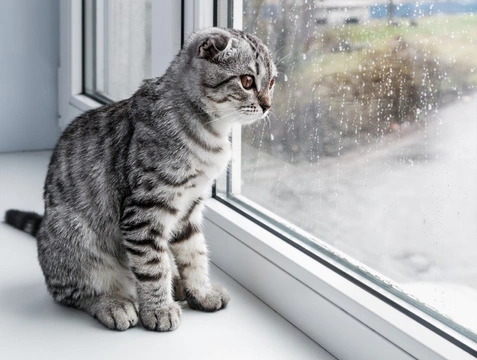
Six situations that might mean your cat would be better as an indoor-only pet
Here in the UK, the vast majority of us keep indoor/outdoor cats, meaning that our cats either have free access to go outside at all times, or are allowed to go outside unsupervised at certain times of the day. This allows cats to live a much more natural lifestyle, and also has a range of other benefits such as helping to provide entertainment, and keep your cat fit and active.
However, in many other countries, keeping cats indoors only is the norm, either due to cultural reasons, legal restrictions due to the impact that cats have on the local ecosystem, or because the outside world is too dangerous.
Whilst ideally all of the UK’s cats should be able to go outside if they want to, this is not always possible, or may not be the ideal situation for certain types of cats or in certain scenarios. It is important to remember that a cat that cannot go outside freely may still be able to go outdoors in limited situations, such as on a lead, or in a secure garden run.
In this article, we will look at six situations that might mean that your cat would be better off kept indoors only, with no access or only restricted access to the outside world. Read on to learn more.
Health conditions
First of all, certain feline health conditions may mean that going outside unsupervised is not suitable for your cat. Exactly what sort of conditions may lead to a decision to keep a cat indoors only can vary-for instance, some cats with disabilities such as three legged cats may be better off inside, but depending on both your cat’s temperament and your local area, others with a missing limb may get on perfectly fine in the outside world.
One blanket situation that should mean that your cat stays indoors only is if your cat is suffering from a health condition such as FIV, and this is for several reasons. First of all, your cat may spread the virus to other cats outside of the home when they come into contact with them, and also, the condition will weaken your own cat’s immune system, making them much more susceptible to picking up minor ills when outside that can turn into serious problems for a cat with a compromised immune system.
Unvaccinated cats
All cats should be vaccinated before they go outside and come into contact with others, which means that cats should be kept indoors before they have had their initial vaccinations and have begun to benefit from their full protection.
However, a small number of cats cannot have their vaccinations, either due to a health condition or due to a previous bad reaction to vaccination.
Over time as your cat ages and is gradually exposed to more and more potential transmissible conditions that their immune systems get used to and begin to generate antibodies against, their natural immunity will rise, helping to protect them against transmissible illnesses.
However, an unvaccinated cat remains at higher risk of becoming ill than one that is vaccinated, so if your cat is unvaccinated for any reason, you may wish to keep them indoors.
Unneutered cats
Unless you are planning to breed from your cat, they should be neutered as soon as possible to prevent unwanted litters in the female, or roaming and fighting in the male.
However, if your cat is unneutered because you do intend to breed from them, the best decision may be to keep them inside, to prevent them from either getting pregnant or wandering off in search of a mate, and potentially getting into hot water.
Busy roads
If you live near to a busy road and your cat either has poor road sense (or if your cat is not very streetwise in general, as can often be the case with the Ragdoll breed), or if they cannot avoid using the road to get to safer areas, it may be a wise decision to keep your cat indoors, or build a garden run for them so that they can remain contained and not need to use the road.
Predators
The area surrounding your home that will make up your cat’s territory must be safe for them to use, and if there are a lot of predators in the area, your cat may not be able to go outside safely. Whilst here in the UK we don’t have to worry about a lot of potentially dangerous wild predators, if your area is full of dogs roaming loose, or other things that may see your cat as a target, think carefully about whether or not they will be safe outside.
Expensive breeds
Finally, whilst cats are not stolen as commonly as dogs are, it does happen nonetheless. If your cat was very expensive to buy, is a member of a rare or uncommon breed or one that is in high demand, the outside world may pose a hazard to them in many ways, including the potential for them to become a target for theft.



